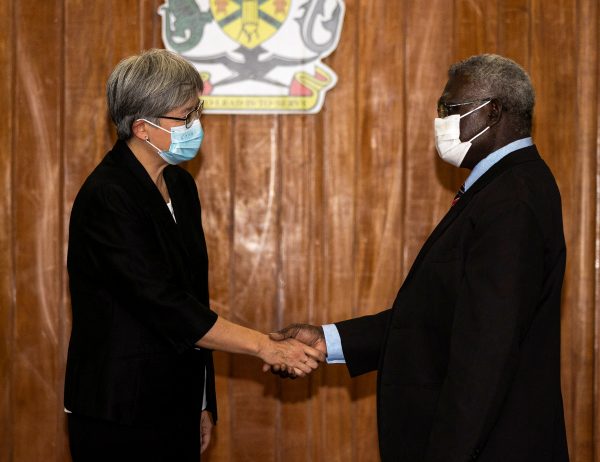The Pacific islands are not pawns in the geostrategic contest but active players with agency. They have become more cautious in dealing with external players and more adept at delivering benefits for their national interests. This is exemplified by the Pacific islands not entering into two broad cooperation agreements with China during Foreign Minister Wang Yi’s visit in May 2022. This reflects their caution in expanding relations with China to security matters — an area of growing sensitivity amid the big-power competition.
Their concerns are exacerbated by the China–Solomon Islands security pact whose nature and implications for regional security remain unclear. For Pacific Island countries, a balance of relations with traditional powers and China is wise.
Pacific island countries have taken the big power rivalry as an opportunity to promote their own agenda. During meetings with US Secretary of State Antony Blinken, Chinese Foreign Minister Wang Yi and Australian Foreign Minister Penny Wong, Pacific leaders reiterated that climate change, not the geostrategic contest, is the region’s biggest threat.
Failing to sign their proposed cooperation agreements with Pacific countries is a setback for China. But the geostrategic competition is far from over and is likely to escalate, with China making notable gains in the region. During Wang’s visit, China secured multiple bilateral agreements with its Pacific partners, including Belt and Road cooperation, disaster relief, infrastructure and tourism with Kiribati and on agriculture, fishery and health with Tonga, to name just a few.
China’s diplomacy has its own strengths and weaknesses. Its support in infrastructure, strengthened by fast approval and delivery, as well as its government scholarships and technical training, are of significant appeal to Pacific Island states. China is promoting small and low-cost projects such as the growth of ‘fungus grass’ (juncao) which can be a cash crop for Pacific farmers. Pilot projects have already started in Papua New Guinea and Fiji and will expand to other Pacific countries as one of China’s six priorities in the region.
China’s influence in the region will continue to be constrained by its dominant government-to-government approach, as its engagement with non-government actors is still sparse. The limited press access during Wang Yi’s trip alienated independent Pacific journalists. China will also face more competition from traditional powers, including on infrastructure. In May 2022, Quad leaders pledged to ‘strengthen health infrastructure… and provide sustainable infrastructure’ in the Pacific.
China’s signing of a security agreement with the Solomon Islands during the 2022 Australian election campaign was a low point in Australia–China relations. China’s swift actions under the cover of an election campaign highlights their weakness as a trusted ‘partner of choice’. Previous rumours of potential Chinese bases were likely overstated, but they were met by Pacific leaders’ deft diplomacy that took advantage of their leverage and persuasive Australian diplomacy. Canberra’s ‘step up’ included increased aid and decisive action, such as outbidding China to build bases in Blackrock in Fiji and Manus Island in Papua New Guinea.
Pacific leaders are using geopolitical contest to deliver benefits for their nations and Australia. Recent events revealed the domestic politics at play in Pacific capitals, a dynamic that is often understated in geopolitical analyses. This trend of domestic politics meeting geopolitical realities should be closely engaged with by the new Labor government and early signals from Wong are positive.
The incoming government shares all the concerns of the Morrison government but has none of the baggage. Labor governments have traditionally been perceived as expressing softer declaratory policy and being stronger on aid. Such approaches will be welcome in Pacific capitals, but climate change is where the Albanese government will be able to dramatically strengthen Australia’s Pacific policy.
Australia already has significant advantages over China, including proximity and historical and cultural ties. The Australian Defence Force has been instrumental in cementing links through military diplomacy, which directly counters China’s presumed military ambitions that threaten Australian interests and Australia itself. The Albanese government’s strong representation on Indigenous issues and climate change will be most welcome in the Pacific.
Penny Wong’s rushed trips to the Pacific to counter China were a great start in resetting relations. Wong sent all the right messages by listening to Pacific concerns, respecting sovereignty, providing enhanced support and responding to climate change. Labor has taken a step up from the Morrison government in engaging respectfully with the security concerns of Pacific Islanders themselves. The heat has been taken out of the Cold War competition for now, but Beijing will learn from this episode and Canberra will have to be vigilant and above all, deliver.
The Pacific is used to Canberra responding to crises only for its support to fade away, but China will always be on the horizon.
Dr Denghua Zhang is research fellow at The Australian National University.
Dr Michael O’Keefe is senior lecturer in international relations at La Trobe University.

